-
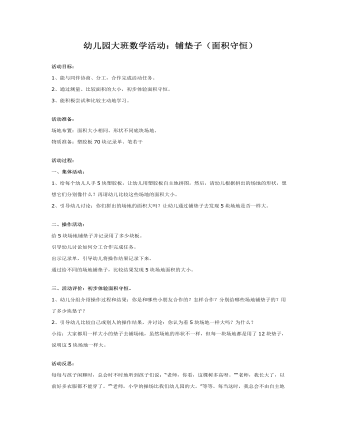
大班数学教案:铺垫子(面积守恒)
2、通过测量、比较面积的大小,初步体验面积守恒。 3、能积极尝试和比较主动地学习。 活动准备: 场地布置:面积大小相同、形状不同底块场地。 物质准备:塑胶板70块记录单、笔若干 活动过程: 一、集体活动: 1、给每个幼儿人手5块塑胶板,让幼儿用塑胶板自主地拼图。然后,请幼儿根据拼出的场地的形状,想想它们分别像什么?再请幼儿比较这些场地的面积大小。 2、引导幼儿讨论:你们拼出的场地的面积大吗?让幼儿通过铺垫子去发现5块场地是否一样大。 二、操作活动:给5块场地铺垫子并记录用了多少块板。 引导幼儿讨论如何分工合作完成任务。 出示记录单,引导幼儿将操作结果记录下来。 通过给不同的场地铺垫子,比较结果发现5块场地面积的大小。

幼儿园小班英语教案:Good night(晚安)
2、能够正确运用句子。 活动准备: 1、玩具娃娃一个。 2、晚上的图片一张。 3、火柴和一支蜡烛。 活动过程: 一、问好,做律动《幸福拍手歌》。 T:Good morning ,boys and girls.Now ,let’s do the actions,Are you ready? C:Yes.(师幼一起律动。) 二、导入 出示晚上的图片(画有星星和月亮),利用图画导入单词。 T:Boys and girls。When does the moon rise up.?(月亮什么时候出来的?) C:晚上. T:Night
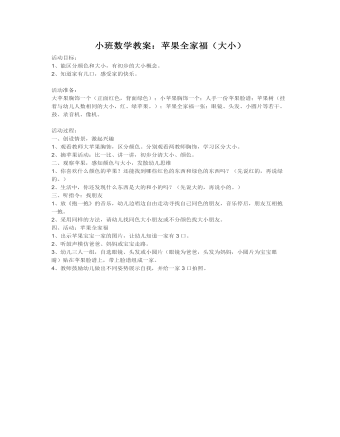
小班数学教案:苹果全家福(大小)
2、知道家有几口,感受家的快乐。 活动准备: 大苹果胸饰一个(正面红色,背面绿色);小苹果胸饰一个;人手一份苹果脸谱;苹果树(挂着与幼儿人数相同的大小,红、绿苹果。);苹果全家福一张;眼镜、头发、小圆片等若干。鼓、录音机、像机。 活动过程: 一、创设情景,激起兴趣 1、观看教师大苹果胸饰,区分颜色。分别观看两教师胸饰,学习区分大小。 2、摘苹果活动:比一比、讲一讲,初步分清大小、颜色。
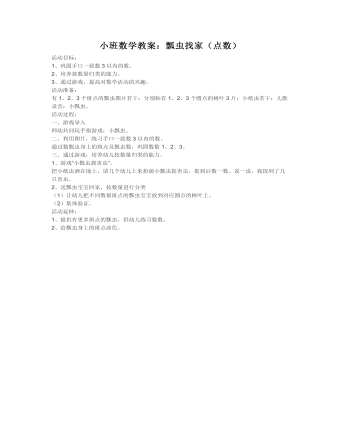
小班数学教案:瓢虫找家(点数)
2、培养按数量归类的能力。 3、通过游戏,提高对数学活动的兴趣。 活动准备: 有1、2、3个斑点的瓢虫图片若干;分别粘有1、2、3个圆点的树叶3片;小纸虫若干;儿歌录音:小瓢虫。 活动过程: 一、游戏导入 师幼共同玩手指游戏:小瓢虫。 二、利用图片,练习手口一致数3以内的数。 通过数瓢虫身上的斑点及瓢虫数,巩固数数1、2、3。
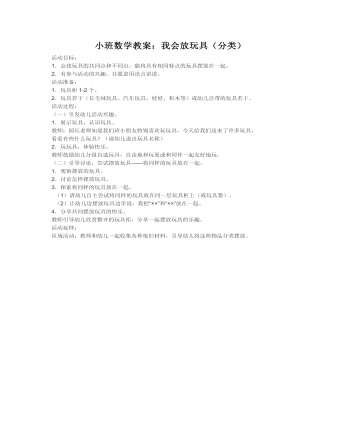
小班数学教案:我会放玩具(分类)
2.有参与活动的兴趣,并愿意用语言讲述。 活动准备: 1.玩具柜1-2个。 2.玩具若干(长毛绒玩具、汽车玩具、娃娃、积木等)或幼儿自带的玩具若干。 活动过程: (一)引发幼儿活动兴趣。 1.展示玩具,认识玩具。 教师:园长老师知道我们班小朋友特别喜欢玩玩具,今天给我们送来了许多玩具, 看看有些什么玩具?(请幼儿说出玩具名称) 2.玩玩具,体验快乐。 教师鼓励幼儿分组自选玩具,自由地和玩耍或和同伴一起友好地玩。

小班美术教案《可爱的大苹果》(撕、贴)
2.通过美工活动的进行学习运用手部小肌肉进行“撕、贴”活动。 3.通过活动的进行让幼儿体会美术创作的积极情绪。 二.准备材料: 1.16开铅画纸(画有苹果)。 2.红色、绿色美工纸若干。 3.固体胶管。 4.桌椅。 三.活动过程: 导入过程: 1.呈现画有大苹果的铅画纸,问①小朋友看到了什么.②小朋友想一想苹果是什么颜色的 2.简述及活动目的,并倾向朋友想一想自己想把苹果贴成什么颜色的.(强调要年贴在苹果图形内部)
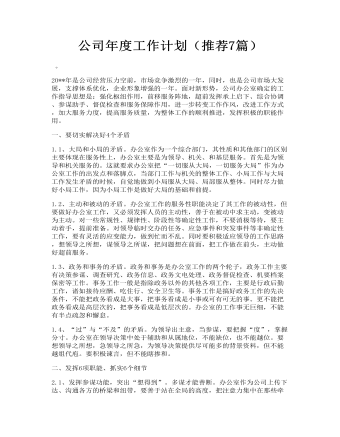
公司年度工作计划(推荐7篇)
1.1、大局和小局的矛盾。办公室作为一个综合部门,其性质和其他部门的区别主要体现在服务性上,办公室主要是为领导、机关、和基层服务。首先是为领导和机关服务的。这就要求办公室把“一切服从大局,一切服务大局”作为办公室工作的出发点和落脚点,当部门工作与机关的整体工作、小局工作与大局工作发生矛盾的时候,自觉地做到小局服从大局、局部服从整体。同时尽力做好小局工作,因为小局工作是做好大局的基础和前提。
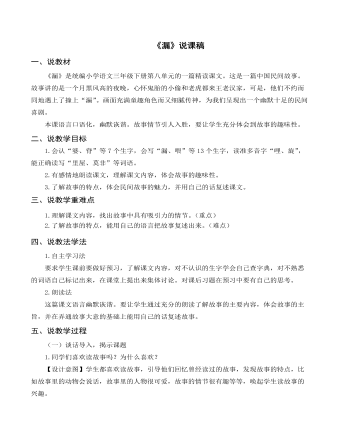
(说课稿)部编人教版三年级下册《漏》
二、说教学目标 1.会认“婆、脊”等7个生字,会写“漏、喂”等13个生字,读准多音字“哩、旋”,能正确读写“里屋、莫非”等词语。2.有感情地朗读课文,理解课文内容,体会故事的趣味性。3.了解故事的特点,体会民间故事的魅力,并用自己的话复述课文。三、说教学重难点1.理解课文内容,找出故事中具有吸引力的情节。(重点)2.了解故事的特点,能用自己的语言把故事复述出来。(难点)四、说教法学法1.自主学习法 要求学生课前要做好预习,了解课文内容,对不认识的生字学会自己查字典,对不熟悉的词语自己标记出来,在课堂上提出来集体讨论。对课后习题在预习中要有自己的思考。 2.朗读法 这篇课文语言幽默诙谐。要让学生通过充分的朗读了解故事的主要内容,体会故事的主旨,并在弄通故事大意的基础上能用自己的话复述故事。

2022年政务公开工作总结汇编(9篇)
今年,我局认真贯彻落实省市区工作部署,以推动阳光行政,建设服务型工商为抓手,不断创新载体,丰富内容,拓展方式,深入推进政府息开工作,有效增强了经工作的透明度,并科学运用政务服务系统服务企业,服务群,服务地方经济社会发展。具体情况如下:一、强化息开载体建设近年来,企业和群息的方式方法发生了深刻变化,对通过网络载体息的要求越来越强烈,为此,我局不断强网络载体建设,有效提高息开工作效能。一是强群、QQ群管理,利用操作简便、传播速度快、社会关注度高的特点,把职能范围内的政府息,特别是有重大影响的工作息及时向社会布,把群、QQ群打造成我局发布政府息,服务群办事,接受社会监督的又一平台。二是借助区政府门户网站平台,发布关于我局的政务动态、部门件,并建立快捷链接,方便群登录我局政务外网。
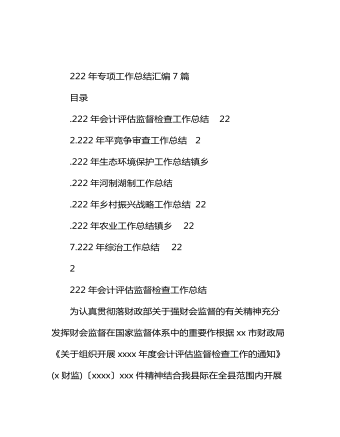
2022年专项工作总结汇编(7篇)
一、精心组织周密安排部署为确保会计评估监督检查工作得成效我局领导高度重视组织全体干部职工集中学习了xx市财政局《关于组织开展xxxx年度会计评估监督检查工作的通知》(x财监)〔xxxx〕xxx)件精神并按照件要求确定了检查时间、检查范围、被检查单位抽调业务人员组成工作组在检查前进行了培训明确了检查目的、责任和检查任务为我县扎开展会计评估监督检查工作提供了保障。二、明确责任积极组织施为了使会计评估监督检查工作得以顺利完成在这次监督检查采了积极有效的方式方法首先是抽调政治质较高业务能力较强的人员成立检查小组做到责任到位分工明确其次广泛宣传充分参与为了把检查工作引向深入检查组布了举报电话同时向自查被查单位下达了《关于组织开展xx县xxxx年度会计评估监督检查工作的通知》(x财监〔xxxx〕xxx),并在政府网站布使广大职工干部能够知晓这次监督检查工作的重要意义广泛的参与到监督检查的工作中来。三、检查的范围主要检查xxxx年会计息质量中介机构执业质量必要时延伸检查并按照检查督查考核的有关要求严格控制检查面。按照相应比例开展了自查并抽部分单位开展重点检查。自查单位xx户并根据自查情况随机抽了x个部门(单位)进行了重点检查同时确定了x家企业和x家代理记账司开展了会计息质量检查。2
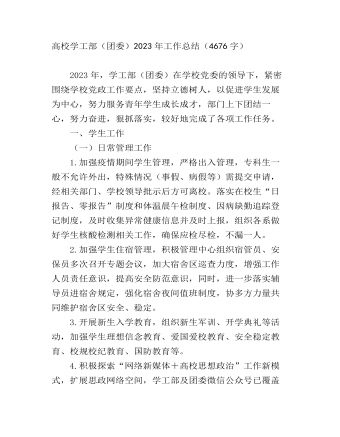
高校学工部(团委)2023年工作总结
一、学生工作(一)日常管理工作1.加强疫情期间学生管理,严格出入管理,专科生一般不允许外出,特殊情况(事假、病假等)需提交申请,经相关部门、学校领导批示后方可离校。落实在校生“日报告、零报告”制度和体温晨午检制度、因病缺勤追踪登记制度,及时收集异常健康信息并及时上报,组织各系做好学生核酸检测相关工作,确保应检尽检,不漏一人。2.加强学生住宿管理,积极管理中心组织宿管员、安保员多次召开专题会议,加大宿舍区巡查力度,增强工作人员责任意识,提高安全防范意识,同时,进一步落实辅导员进宿舍规定,强化宿舍夜间值班制度,协多方力量共同维护宿舍区安全、稳定。3.开展新生入学教育,组织新生军训、开学典礼等活动,加强学生理想信念教育、爱国爱校教育、安全稳定教育、校规校纪教育、国防教育等。4.积极探索“网络新媒体+高校思想政治”工作新模式,扩展思政网络空间,学工部及团委微信公众号已覆盖全体在校生,其中,学工部微平台设立了“国奖人物”、迎新指南等板块,宣扬榜样力量,强化爱国教育、营造积极向上的校园氛围。团委微平台设立了团团快讯、青年之声等板块,立足宣传、发声的功能定位,着力提升网络舆论引导的影响力、引领力。
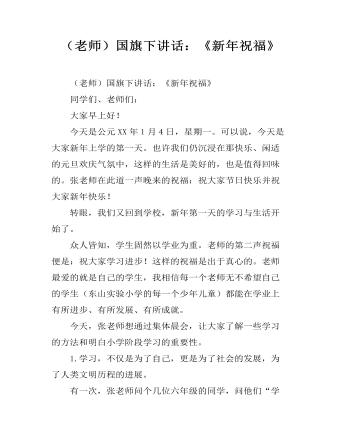
(老师)国旗下讲话:《新年祝福》
众人皆知,学生固然以学业为重。老师的第二声祝福便是:祝大家学习进步!这样的祝福是出于真心的。老师最爱的就是自己的学生,我相信每一个老师无不希望自己的学生(东山实验小学的每一个少年儿童)都能在学业上有所进步、有所发展、有所成就。今天,张老师想通过集体晨会,让大家了解一些学习的方法和明白小学阶段学习的重要性。1.学习,不仅是为了自己,更是为了社会的发展,为了人类文明历程的进展。有一次,张老师问个几位六年级的同学,问他们“学习是为了谁?”,有人抢答:“为了自己”。虽然这样的话很简单、很质朴、很天真,但也存有自私、狭隘,如井底之蛙,见识太短,追求太小。我们大家熟知的周恩来总理在我们这样的年龄就立志“为中华之崛起而读书”, 在以后的抗日战争、全国解放战争、新中国建设中不断磨砺自己,并时刻不忘学习与读书,他为社会的发展,人民的幸福、祖国的富强鞠躬尽瘁,成为人民永远爱戴的好总理。2.学习,不仅是丰富自己的文化知识,更是塑造良好的自我形象。
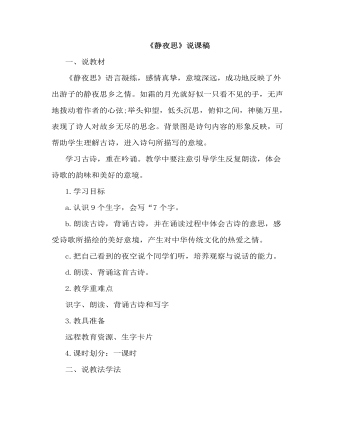
部编人教版一年级下册《静夜思》(说课稿)
为了使学生能在视、听、说、思等几个环节中经历学习的过程,体验学习语文的乐趣,顺利达成教学目标,我设计的教学过程如下:1.观察交流、激发兴趣、情景导入为了能让学生更好的体会静夜,我设计了这一环节。在上新课前一晚,布置学生去观察夜晚的天空,然后上课时把自己观察到夜空的内容和感受,说给同学听,大家互相交流下。交流后引入新课:静夜思。课题引入后,给学生解释下课题,让学生思考一下,诗人是在什么时候思念,又思念些什么?提问后,把远程教育碟片切到《静夜思》这课,让学生欣赏课文。2.初读古诗,整体感知,认读生字我设计这一环节,是想让学生通过自己朗读课文,去发现这课的生字,并在这环节中,要求学生利用拼音帮助自己读准每个字,尤其是一些后鼻音,让学生成为学习的主人。
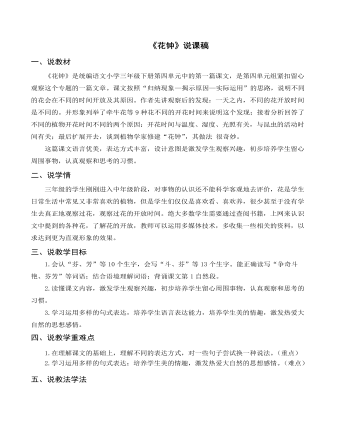
(说课稿)部编人教版三年级下册《 花钟》
三、说教学目标1.会认“芬、芳”等10个生字,会写“斗、芬”等13个生字。能正确读写“争奇斗艳、芬芳”等词语;结合语境理解词语;背诵课文第1自然段。2.读懂课文内容,激发学生观察兴趣,初步培养学生留心周围事物,认真观察和思考的习惯。3.学习运用多样的句式表达,培养学生语言表达能力,培养学生美的情趣,激发热爱大自然的思想感情。四、说教学重难点1.在理解课文的基础上,理解不同的表达方式,对一些句子尝试换一种说法。(重点)2.学习运用多样的句式表达;培养学生美的情趣,激发热爱大自然的思想感情。(难点)五、说教法学法[说教法]通过自主、合作、探究的体验性小组合作学习方式,读中感悟、读中体验,采用“激趣——发现——感悟——实践”的思路,引导学生在自主中学习本文。
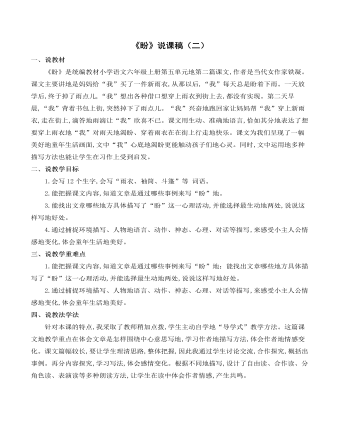
部编人教版六年级上册《盼》说课稿(二)
一、说教材 《盼》是统编教材小学语文六年级上册第五单元地第二篇课文,作者是当代女作家铁凝。课文主要讲地是妈妈给“我”买了一件新雨衣,从那以后,“我”每天总是盼着下雨。一天放学后,终于掉了雨点儿,“我”想出各种借口想穿上雨衣到街上去,都没有实现。第二天早晨,“我”背着书包上街,突然掉下了雨点儿。“我”兴奋地跑回家让妈妈帮“我”穿上新雨衣,走在街上,滴答地雨滴让“我”欣喜不已。课文用生动、准确地语言,恰如其分地表达了想要穿上雨衣地“我”对雨天地渴盼、穿着雨衣在在街上行走地快乐。课文为我们呈现了一幅美好地童年生活画面,文中“我”心底地渴盼更能触动孩子们地心灵。同时,文中运用地多种描写方法也能让学生在习作上受到启发。 二、说教学目标 1.会写12个生字,会写“雨衣、袖筒、斗篷”等 词语。 2.能把握课文内容,知道文章是通过哪些事例来写“盼”地。

部编人教版六年级上册《盼》说课稿(一)
【教材分析】《盼》是六年级第五单元的一篇课文。本文选自作家铁凝的第一本出版小说《夜路》,是一篇儿童文学类的小说。作者以孩子的视角,记述了得到新雨衣,渴望下雨到愿望实现——在雨中穿上了新雨衣的故事。用细腻的语言描述了小主人公情感和心理的变化,表现了童真童趣。【教学目标】1.疏通重难点字词的读音和写法。2.整体感知课文内容,把握故事情节,理清行文思路,感受小主人公因新雨衣而产生的“盼”。3.通过捕捉环境描写、人物的语言、动作、神态、对话等描写,来感受小主人公情感的变化。【教学重难点】通过捕捉环境描写、人物的语言、动作、神态、对话等描写,来感受小主人公情感的变化。【教学过程】核心问题:作者如何围绕一个“盼”字展开描写,表现小主人公的情感变化?

2024年第一季度工作总结汇编(32篇)
按照“谁起草、谁审查”的原则,结合工作实际,我局制定下发了《XX市XX区司法局关于关于在市场体系建设中建立公平竞争审查制度的通知》,并要求局属各部门负责本部门出台政策措施的公平竞争审查和合法性审查工作,在起草文件过程中严格对照《XX市XX区人民政府办公室关于在市场体系建设中建立公平竞争审查制度的通知》(晋政办通〔2017〕138号)要求中的内容,就审查对象、标准和要求进行严格审查。确保我局制定的有关政策措施符合公平竞争和相关法律法规要求,防止出现排除、限制竞争的情况。二、有序开展自查清理工作根据自查清理工作要求,我局认真对发文进行重点审查,对已出台的政策文件,严格进行自我审查。经清理,我局一季度未出台过涉及市场主体经济活动的规章、规范性文件、其他政策措施等。三、工作亮点
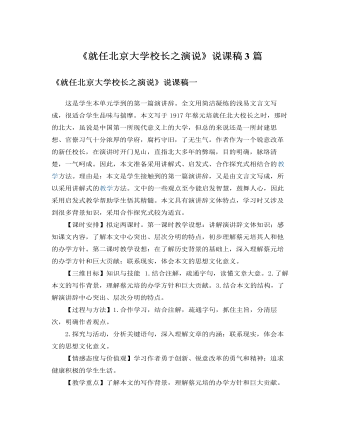
人教版高中语文必修2《就任北京大学校长之演说》说课稿3篇
(三)教学重、难点1、教学重点:结合课文,了解演讲辞针对性强、条理清楚、通俗易懂、适当的感情色彩等特点。2、教学难点:深入理解文章内涵,联系现实,体会本文的现实意义二、说学情高中学生在初中阶段已经接触过演讲辞了,对演讲词的特点已经有了一些基本的知识,因此本轮的教学应该让他们在此基础上有所提高。本文是学生在高中阶段第一次接触演讲辞,有必要让他们了解演讲辞的特点及课文如何体现这些特点的。随着年龄的增长,生活阅历的增加,高中学生正逐渐形成自己对世界、对人生的看法,蔡元培先生的这篇文章能很好地激发他们对当前的高中学习和未来的大学生活进行思考。此外,学生对北大的历史及蔡元培先生作这番演讲的时代背景了解不深,应作出补充说明。
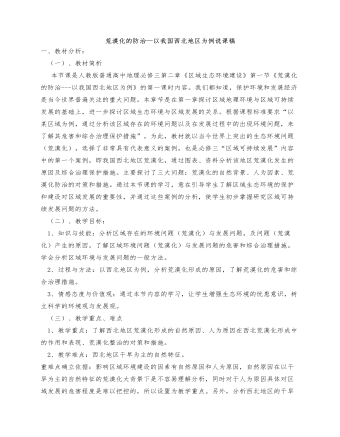
人教版高中地理必修3荒漠化的防治—以我国西北地区为例说课稿
(设计意图: 通过这两个问题探究的形式可以了解学生对二、干旱为主的自然特征这一知识点的掌握情况,随堂练习有利于巩固强化学生的条例性知识。)三、荒漠化的成因1、自然因素:干旱、气候异常2、人为因素:(是荒漠化发生、发展的决定因素)自然原因启发学生利用已经学过的知识(干旱为主的自然特征)和给出的PPT资料来进行分析。人为原因以其危害结果用图表和图片的形式展示,使学生认识到人为因素是导致荒漠化最主要的因素。(设计意图:通过分析自然因素提供学生分析一区域环境建设的自然基础条件,而这也是较难的一点,再者,通过分析人为原因,是学生树立区域生态环境保护意识。)四、布置作业:书本课本20—22的活动—— 非洲萨赫勒地区荒漠化的自然、社会经济
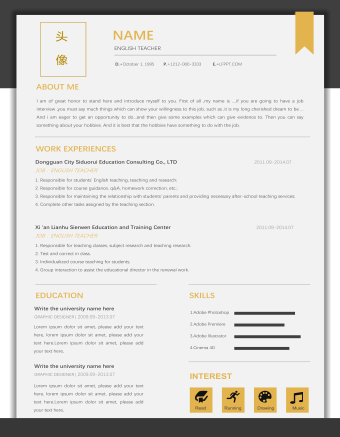
英文简历-英语老师简历
I am of great honor to stand here and introducemyself to you. First of all ,my name is ....if you are going to have a jobinterview ,you must say much things which can show your willingness to thisjob, such as ,it is my long cherished dream to be ... And i am eager to get anopportunity to do...and then give some examples which can give evidence to.Then you can say something about your hobbies. And it is best that the hobbieshave something to do with the job.


